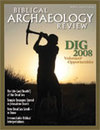Archaeology and Modern Scholars
 There is an interesting article in the latest edition of Biblical Archaeology Review in which Richard Friedman, famed as the author of "Who Wrote the Bible", provides a challenging book review of James Kugel’s "How to Read the Bible" . Kugel’s book claims to reconcile the "documentary hypothesis," which claims that the Torah was written by people over a period of about 1000 years, with Orthodox Judaism.
There is an interesting article in the latest edition of Biblical Archaeology Review in which Richard Friedman, famed as the author of "Who Wrote the Bible", provides a challenging book review of James Kugel’s "How to Read the Bible" . Kugel’s book claims to reconcile the "documentary hypothesis," which claims that the Torah was written by people over a period of about 1000 years, with Orthodox Judaism.
Friedman is sharply critical of Kugel’s book, largely because he feels Kugel has not made much of a case for Orthodox Judaism in the face of his acceptance of the documentary hypothesis. Friedman suggests on the one hand "The Orthodox Jewish community is going to have to confront a difficult phenomenon: that anyone who really learns all of the present state of the evidence will be persuaded by it." And on the other hand he says "Kugel should not defend a system of incorrect beliefs on the grounds that it is tied to things that people still think."
I think both Friedman and Kugel miss a very important point.
Is Kugel, in fact, an Orthodox Jew? What does it mean to be Orthodox? Does it mean you go to an Orthodox shul? Observe halacha in an Orthodox fashion? Or does it mean what you believe?
Kugel, I would suggest, is "Orthoprax" but not "Orthodox."
Many Orthodox rabbis I know "draw the line" at "Torah miSinai." If you believe every word in the Torah is literally the word of God, and Moses took dictation, you are Orthodox. When Kugel states he accepts the documentary hypothesis — the idea that the Torah was written down by different people over a period of years — he has essentially taken himself outside of the Orthodox camp theologically. And put himself squarely in the Conservative camp. It’s what the Conservative movement has been saying for years.
Friedman observes that as the book progresses Kugel uses the term "Orthodox Judaism" less and "traditional Judaism" more. I suggest this is because Kugel realizes the split he has made with traditional Orthodox thought. He is still traditional in practice, but not Orthodox in belief.
And this demonstrates the problem with our denominational labels. For many people they are simply a statement of where they like to pray, not a statement of what they believe. Many people who go to Modern Orthodox shuls are actually Conservative in their theology. The pews of Conservative synagogues are filled with Jews whose beliefs are Reform. And I know ordained Reform rabbis whose beliefs and practice would be mainstream in the Conservative movement.
How do these people label themselves? By what they believe? Or by where they daven?
I suggest mostly they label themselves by where they choose to pray — the community they choose to identify with — regardless of what they personally believe about the nature of God, Torah, and mitzvot.
However, when someone is claiming, as Kugel does, to have somehow reconciled Orthodox Judaism with the documentary hypothesis, I think he should stick to a more technical definition of the term Orthodox. And it seems to me, virtually by definition, Orthodox theology and the documentary hypothesis are mutually exclusive.
I know Orthodox rabbis who beliefs about the Torah and Mt. Sinai are exactly the same as mine — that Torah and Sinai represent a profound encounter between God and Man, that there is some piece of the Divine in the Torah, yet the Torah is also a book that was subject to some editing over time. Yet none of them would dare admit it publicly, in so many words, for fear of being thrown out of his community.
One other error of Friedman’s I’d like to point out: he claims most Jews do not follow the Oral Torah. Friedman says "I do know many Jews (in fact, most, but not most Orthodox Jews) who would take the Bible without the Oral Torah."
When I was a pulpit rabbi, I had one congregant who on occasion would enjoy trying to get a rise out of me by saying, "come on rabbi, don’t give all that stuff that was made up by a bunch of rabbis. I just want to know what God said, in the Torah."
But that same person lit candles on Chanukah — a holiday found nowhere in the Hebrew Bible (Maccabees is part of the Catholic canon, but not the Jewish) — it is a rabbinic holiday. She lights candles on Friday night — a rabbinic custom, found nowhere in the Bible, but rather found in the Talmod. Etc., etc. Judaism as practiced today IS rabbinic Judaism, and it IS based on the Talmud. Even Jews who are ignorant of the doctrine of the Oral Torah, or who claim to disagree with it, in fact still practice a religion that is based on it.
Rav Baruch
